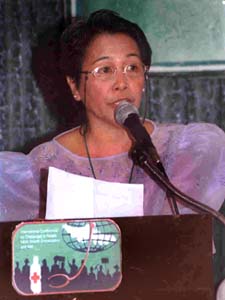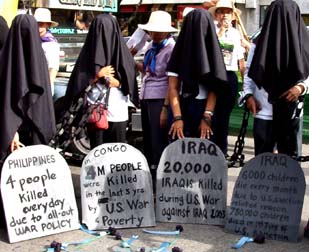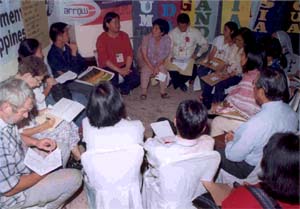|
|
Warfare
Over Health Care
Foreign doctors, health professionals
decry globalization, war on terror
Today’s
magnifying globalization and war has transmuted the “health is wealth” cliché—-that
one’s right to live is in the hands of a few who dominate the world.
BY
DENNIS ESPADA
Bulatlat.com
|

Dr.
Eleanor Jara of the Council for Health and Development delivers the
welcome remarks. |
“Unhampered economic globalization has caused increasing poverty while United
States’ (US)-led wars of aggression maim and massacre millions of people and
destroy social infrastructures and our planet Earth itself…this makes the
world more dangerous and filled with unspeakable suffering and death.”
Thus declared at least 120 doctors, nurses, medical professionals and workers
from 12 countries who participated in the International Conference on Challenges
in Health Work amidst Globalization and War in Manila last Nov. 10. The
participants vowed to launch a broader resistance to U.S. intervention and its
unilateral policy of preemptive war to combat terrorism.
The
Council for Health and Development (CHD), International League of Peoples'
Struggles (ILPS)-Ad Hoc Health Commission, International People's Health Council
and the People's Health Movement organized the conference.
|
U.S. wars: a tragic and painful ordeal
The actual costs of war are immeasurable, not to mention its psychosocial impact
on human beings. According to Politics of Health Knowledge Network, the world
spends about $863 billion every year on military expenditures, with the U.S.
military purportedly to spend $399 billion next year.
Every day, at least 30,000 children (or 11 million per year) die from
preventable and curable diseases worldwide. And yet the world just needs $9
billion to provide water and sanitation for all people in developing countries
while $2.5 billion is required for global HIV/AIDS prevention annually. As of
Sept. 23, Iraqi civilian deaths number between 7,757 and 9,565.
Dr. Bert De Belder, coordinator of Medical Aid for the Third World (MATW), a
health solidarity agency of the International Action for Liberation (Intal),
related during the conference the testimonies of four medical doctors namely:
Drs. Geert Van Moorter, Colette Moulaert, Harrie Dewitte and Claire Geraets who
volunteered for emergency medical aid in Baghdad at the height of the U.S.
invasion of Iraq.
|
“They learned how the water and electricity supply were deliberately targeted
by U.S. bombs, inflicting further hardship on the civilian population.” De
Belder said. “They heard how U.S. troops left wounded Iraqi soldiers to die
alongside the road. They were confronted with the dreadful wounds caused by U.S.
and British cluster bombs, the use of which in populated areas is prohibited by
international law.”
A Belgian medical doctor, De Belder is co-author of the book “Kasama: The
Philippine Struggle for Health and Liberation Through the Eyes of Two Belgian
Doctors” (together with Rita Vanobberghen), a biographical account on
their stay in the Philippines in the 1990s.
|

International
health workers’ protest against commercialization of health services
|
“They [the doctors] were witness to U.S. tanks shooting at ambulances—yet
another violation of international humanitarian law,” De Belder said.
Tearing down the
wall of oppression
More
than two million people in Palestine are “virtually under house arrest” as a
result of Israel’s military occupation. A security fence has been built by the
Israeli government between the two territories, effectively restricting the
movements of Palestinians and violating their right to freely move around.
To
display their support to Palestinians’ quest for independence, health
activists attending the conference tore down replicas of the “separation
wall” which symbolize the security fence being built by Israel around
Palestine.
Dr. Unnikrishnan PV, a delegate from India and spokesperson of Humanitarian
Action, berated U.S.-controlled media for propagating deceptions and lies on the
Palestinian conflict. He appealed to the Filipino media, “not to follow that
lie and continue to uncover the truth which is extremely important for the
people of the world.”
Health for all
Twenty-five years since the World Health Assembly held in September 1978 and the
signing of the Alma Ata Declaration which defined the strategy of primary health
care and the goal of “health for all by the year 2000,” access to adequate
and affordable health care is rapidly declining, especially in Third World
countries.
The
Alma Ata Declaration states that: “health, which is a state of complete
physical, mental and social well-being, and not merely the absence of disease or
infimity, is a fundamental human right and that the attainment of the highest
possible level of health is a most important worldwide social goal whose
realization requires the action of many other social and economic sectors in
addition to the health sector.”
Since the 1980s, the policies and impositions of the World Bank (WB),
International Monetary Fund (IMF) and the World Trade Organization (WTO) have
converted health care from basic service into a lucrative source of mammoth
profits for capitalist investors along the paradox of “free trade.”
For instance, with the Trade Related Aspect of Intellectual Property Rights
(TRIPS) agreement, protection of patent rights was introduced where they did not
exist, raising prices of drugs from 12 percent to 200 percent which made them
out of reach for those who need them most. TRIPS declared a minimum period of 20
years for the duration of patents, delaying the availability of cheaper, generic
medicines.
|

Conference
workshop |
The General Agreement on Trade in Services (GATS) on health, on the other hand,
liberalizes the entry of foreign investments and professionals in the service
sectors. Capitalist investors are allowed to enter the WTO-member countries,
control hospitals and laboratory services, and institute profit-oriented health
maintenance organizations.
Emma Manuel, president of the Alliance of Health Workers (AHW), sums up the
impacts of WTO, including TRIPS and GATS. “WTO signals the death of the public
health system in Third World countries. It is dangerous to people’s health,”
she said. |
Passport for overseas work
It has come to be that the nursing profession in the Philippines is largely seen
as a passport to go abroad.
Martha Roberts of the Grassroots Women from Vancouver, Canada, reported that
Canada’s immigration policies are, in effect, gearing toward health care
privatization where migrant workers with professional training (mainly
Filipinos) come to Canada through the Live-In Caregiver Program to work 24 hours
a day in their employer’s home for little more than $2 dollars an hour.
“This is a version of modern-day slavery and exploitation by the Canadian
state,” Roberts said. “I spoke with doctors who said they’re planning to
go back to study nursing so they can immigrate to Canada.”
Elsie Brandes-de Veyra, president of the Philippine Nurses Association in Metro
Manila, laments the exodus of Filipino nurses to other countries. She believes,
however, that nurses will not choose to leave the country “if only our
government will support their needs,” she said.
AHW's secretary-general Jossel Ebesate described the situation of nurses as “a
bit frustrating.” He says that organizing the nurses and other health workers
is a challenge and not without obstacles.
“But as we expose them to poor communities and they grasp the realities of our
country’s social ills, some of them change their minds and realize that
they’re more needed here,” Ebesate said. Bulatlat.com
Photo
courtesy of Council for Health and Development
Back
to top
We
want to know what you think of this article.
|

